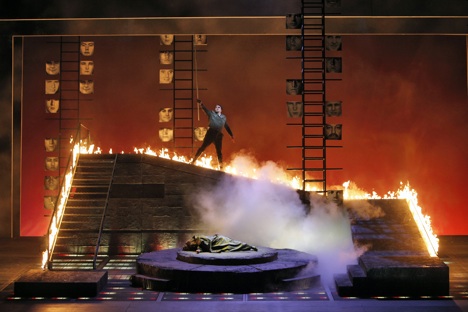
Invoking the Elemental
There were times when I felt as if we were sitting in a movie theater, everyone’s vision directed toward large images splashed across the scrim at the front of the stage.
That’s not a complaint, by the way.
One of the most difficult aspects of staging any part of Wagner’s Ring of the Nibelung might be the problem of creating a convincing visual rendering of the cycle’s physical and psychological terrains.
Focusing the audience’s collective gaze on a wide screen where massive visuals surge—the tumultuous surface of the ocean, storm clouds, lightning illuminating the darkened world in vivid streaks—is a brilliant way to enlarge the theatrical setting that houses San Francisco Opera’s current production of Die Walküre. The opera, after all, strives to be elemental.
The music is inherently mythic, and Donald Runnicle’s affinity with the German composer’s complex and refulgent world of emotional upheaval is conspicuous; under his baton, the orchestra performs wondrously. The singers are divine—with voices that fly easily over Wagner’s orchestral extravagances.
Sky-high terrains of the voice
Sopranos rule the stage in this production. Eva-Maria Westbroek makes her San Francisco Opera debut as Sieglinde, the female half of the twins sired by the god Wotan in his dalliance with a mortal. She’s gorgeous, with a subtle theatrical presence and an enormous voice that retains a feminine quality in its tonal beauty.
Nina Stemme sings Brünnhilde, and it’s hard to believe that such a powerful, superbly rich voice can come out of such a tiny body, but Stemme throws all of her formidable emotional energy into the role: when she enters Wotan’s office, where an urban Valhalla of skyscrapers and grey clouds stretches out below the boardroom windows, her high-note war cry “Heiaha! Heiaha!” seems wild and victorious—“I am a really crazy girl!” she seems to be singing. But her revelation to Siegmund, under the unfinished freeways of the city where trash and discarded car seats have settled, that he will die in battle has the somber-toned depths of an orphic sorceress.
Janina Baechle sings a commanding Fricka, and the eight Valkyries that accompany Brünnhilde in her final confrontation with their father, Wotan, are both splendid and charming in their aviator togs, long fluttering scarves and scintillating harmonies.
The men held their own against this bevy of vocal pulchritude. Tenor Christopher Ventris was especially attractive as a golden-voiced and heroic Siegmund. And former Adler Fellow (they’re everywhere) Mark Delavan sang the conflicted Wotan, who destroys the children he adores even as he plots to save his world of gods and heroes. Bass Raymond Aceto sings and acts terrifically as the redneck hunter guy, Hunding, Sieglinde’s husband.
Director Francesca Zambello’s decision to place the cycle in an American cultural setting shines with insight. Not simply because it allows for a cinematographic visualization, complete with computer-graphic manipulations and designed by Jan Hartley, that is ultimately both American and mythic, but also because of the political resonances that it evokes. The strife over power and money has become identified as an American struggle. And the complications that it creates within the family structure are recognizable. In one of the production’s most overt political statements, the Valkyries place photos of the heroes that they take in war on a ladder-like structure, showing the faces of the army that Wotan is enlisting, through death, to protect Valhalla: the photos are of soldiers who have died in the American wars in Afghanistan and Iraq, used with their families’ blessings.
The opera’s creative team produced some imaginative sets (Michael Yeargan), vibrant, stunning lighting (Michael McCullough) and stylish costume design (Catherine Zuber), allowing the opera with all its complicated motifs to move seamlessly toward its blazing resolution.
—Jaime Robles
The San Francisco Opera’s production of Wagner’s “Die Walküre” continues at the War Memorial Opera House through June 30. For tickets and information, call 415-864-3330 or visit www.sfopera.com.
Also published in the Piedmont Post.
Photo: Mark Delavan and Nina Stemme in the last act of “Die Walküre” by Cory Weaver.
